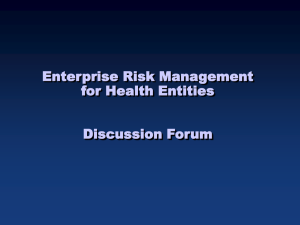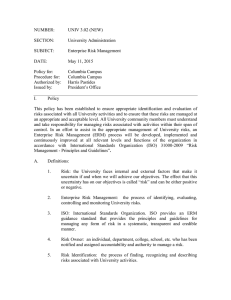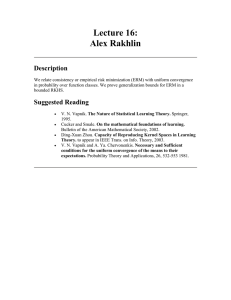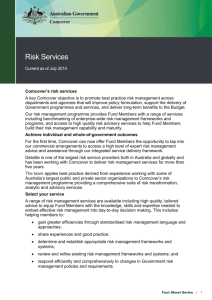This work is licensed under the Creative Commons Attribution
advertisement
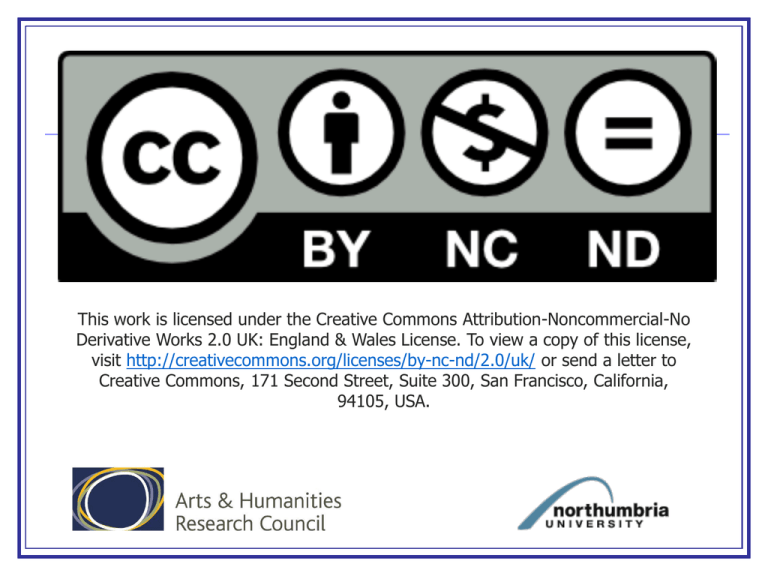
This work is licensed under the Creative Commons Attribution-Noncommercial-No Derivative Works 2.0 UK: England & Wales License. To view a copy of this license, visit http://creativecommons.org/licenses/by-nc-nd/2.0/uk/ or send a letter to Creative Commons, 171 Second Street, Suite 300, San Francisco, California, 94105, USA. Toolkits for Advancing Practice Julie McLeod Northumbria University RMAA Post Convention Seminar 16 September, Melbourne Overview tools for managing records existing tools ISO 15489 & BIP guidelines RM compliance & capacity toolkits potential new tools are they adopted or adapted? are they appropriate? are they advancing practice? AC+erm project conclusions 1. ISO 15489 & BIP 0025 impact in the UK findings adopters & non-adopters limited impact BIP 0025 (1-4): Effective records management 2. RM capacity & compliance toolkits self assessment toolkits to measure records & information management the toolkits capacity, compliance, readiness IGT (Information Governance Toolkit), UK IMCC (Information Management Capacity Check), Canada RMCAS (Records Management Capacity Assessment System), UK/Int RiskProfiler, USA evaluation criteria Adopters: case examples IGT IMCC National Library & Archive (Canada), 1200 staff, merger RMCAS Acute Trust (UK), 1500 staff, mandatory assessment Bank (Africa), 300 staff, quick RM assessment RiskProfiler Government department (Holland), 4000 staff, voluntary pilot & quick compliance assessment (ISO 15489) Adopter experiences “effective way of focusing the Trust across the range of IG requirements including RM” “as far as I know there‟s no tool that is close to providing as much utility as this one” “it was a great tool to bring people together to discuss issues of IM and to learn more about what other people in the institution do” “overview of where we stood in the „battle of compliance‟”; “kind of road map for improvement” Adoption: value & benefits assessment different purposes &/or levels of use measure of compliance &/or capacity benchmark against standards/others identify strengths/weaknesses „quick & dirty‟ vs detailed working with others raise awareness, communicate, build partnerships 3. AC+erm ACcelerating the pace of +positive change in erm critically explore issues & practical strategies develop critical global view of ERM gather multi-disciplinary opinion on ERM issues gather knowledge of practical strategies & CSFs develop an appropriate paradigm for ERM The team… Julie McLeod – Project Director Sue Childs – Research Fellow Rachel Hardiman – Senior Research Assistant Naomi Hay-Gibson – PhD student Information & Knowledge Systems Research Group, School of Computing, Engineering & Information Sciences Our approach qualitative multi-disciplinary participants & stakeholders three main phases comprehensive systematic literature review investigation phase dissemination activity Systematic literature review Main Focus 3 bibliographic databases searched 6% 5% 9% characteristics of the literature35% main focus, author sector 19% 26% analysis of critical success factors 1,281 resources identified; ~49% selected 19 CSFs, 10 specific to EDRMS analysis of people issues 8 themes, 13 sub-themes Mixed Processes Technology Theoretical People Not specified Investigation phase three facets of designing an architecture for ERM e-Delphi studies & colloquia outputs people issues understanding work processes systems and technologies results & vignettes significant study over 200 people all stakeholder groups People investigation interim results issues 8 groups most urgent issues People investigation interim results issues 8 groups most urgent issues 1. CEOs, executives & management lack understanding of RM and their role within that 2. Records professionals need appropriate knowledge/skills, approaches and relationships for the e-environment 3. RM & IM principles and practices need to be a valued and integral part of the organisation People investigation interim results issues 8 groups most urgent issues solutions to try to avoid „Other‟ solutions to avoid Solutions to try People investigation interim results issues solutions 8 groups most urgent issues to try to avoid emergent themes analysis roles & turf wars, ownership & autonomous actors, cultural change, change management, bottom line Dissemination phase project website a blog www.northumbria.ac.uk/acerm all interim results See SLR & Designing an architecture > People facet sections post interim findings collect views, encourage trans-disciplinary debate articles, conference papers & final colloquium Participating in the project contributor in search of successful solutions - online survey Sept 2008 next e-Delphi studies processes (Oct-Dec 2008); technology (early 2009) colloquia in the UK blog email eb.acerm@unn.ac.uk user website www.northumbria.ac.uk/acerm blog http://acerm.blogspot.com Conclusions adopting &/or adapting? analyzing appropriateness? tools & principles - evidence of both research projects & work-based evaluation acting on experience to advance practice? evidence in literature, research data, students … and the research - practice partnership
